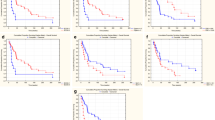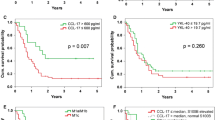Abstract
Thymidine kinase 1 (TK1) is involved in cancer progression. Metastatic site is a prognostic factor in melanoma. We assessed whether serum levels of TK1 are associated with metastatic sites or prognosis in patients treated for stage IV melanoma. The study included 64 patients, who received dacarbazine or four-drug chemotherapy (dacarbazine, vincristine, bleomycin, and lomustine) both combined with interferon-alfa. Serum samples for TK1 were analyzed by ELISA. The patients (n = 22) with only skin and subcutaneous metastases had significantly lower mean TK1 levels (1,639 pg/ml) than the patients (n = 42) with other distant metastases (2,586 pg/ml, Mann–Whitney, p = 0.031). TK1 levels above the median (1,590 pg/ml) were significantly related to deep lymph node involvement (odds ratios 3.672; 95 % confidence intervals 1.024–12.843, p = 0.036). There were no other significant associations between TK1 levels and tumor burden nor were the levels significantly related to the response to therapy or survival. Those eight patients who had received previous adjuvant IFN-alfa therapy had lower mean TK1 levels (1,735 pg/ml) as compared to those 56 patients without previous IFN-alfa therapy (2,338 pg/ml, analysis of variance, p = 0.026). This is the first study exploring serum TK1 in melanoma. TK1 might be involved in the deep lymphatic dissemination and progression of melanoma metastasis.

Similar content being viewed by others
References
Kalady MF, White RR, Johnson JL, Tyler DS, Seigler HF. Thin melanomas: predictive lethal characteristics from a 30-year clinical experience. Ann Surg. 2003;238:528–35. doi:10.1097/01.sla.0000090446.63327.40.
Gimotty PA, Elder DE, Fraker DL, Botbyl J, Sellers K, Elenitsas R, Ming ME, Schuchter L, Spitz FR, Czerniecki BJ, Guerry D. Identification of high-risk patients among those diagnosed with thin cutaneous melanomas. J Clin Oncol. 2007;25:1129–34. doi:10.1200/JCO.2006.08.1463.
Gould Rothberg BE, Bracken MB, Rimm DL. Tissue biomarkers for prognosis in cutaneous melanoma: a systematic review and meta-analysis. J Natl Cancer Inst. 2009;101:452–74. doi:10.1093/jnci/djp038.
Winnepenninckx V, Lazar V, Michiels S, Dessen P, Stas M, Alonso SR, Avril MF, Ortiz Romero PL, Robert T, Balacescu O, Eggermont AM, Lenoir G, Sarasin A, Tursz T, van den Oord JJ, Melanoma Group of the European Organization for Research and Treatment of Cancer. Gene expression profiling of primary cutaneous melanoma and clinical outcome. J Natl Cancer Inst. 2006;98:472–82. doi:10.1093/jnci/djj103.
Florell SR, Smoller BR, Boucher KM, Grossman D, Harris RM, Bowen GM, Leachman SA. Sampling of melanocytic nevi for research purposes: a prospective, pilot study to determine effect on diagnosis. J Am Acad Dermatol. 2008;59:814–21.
Becker D, Mihm MC, Hewitt SM, Sondak VK, Fountain JW, Thurin M. Markers and tissue resources for melanoma: meeting report. Cancer Res. 2006;66:10652–7. doi:10.1158/0008-5472.CAN-06-0921.
Ke PY, Chang ZF. Mitotic degradation of human thymidine kinase 1 is dependent on the anaphase-promoting complex/cyclosome-CDH1-mediated pathway. Mol Cell Biol. 2004;24:514–26. doi:10.1128/MCB.24.2.514-526.2004.
Al-Madhoun AS, Tjarks W, Eriksson S. The role of thymidine kinases in the activation of pyrimidine nucleoside analogues. Mini Rev Med Chem. 2004;4:341–50.
Wu C, Yang R, Zhou J, Bao S, Zou L, Zhang P, Mao Y, Wu J, He Q. Production and characterisation of a novel chicken IgY antibody raised against C-terminal peptide from human thymidine kinase 1. J Immunol Methods. 2003;277:157–69.
Gowda A, Byrd JC. Use of prognostic factors in risk stratification at diagnosis and time of treatment of patients with chronic lymphocytic leukemia. Curr Opin Hematol. 2006;13:266–72.
Madewell BR. Serum thymidine kinase activity: an alternative to histologic markers of cellular proliferation in canine lymphoma. J Vet Intern Med. 2004;18:595–6.
Di Raimondo F, Giustolisi R, Lerner S, Cacciola E, O’Brien S, Kantarjian H, Keating MJ. Retrospective study of the prognostic role of serum thymidine kinase level in CLL patients with active disease treated with fludarabine. Ann Oncol. 2001;12:621–5.
Schwartz MK. Enzymes as prognostic markers and therapeutic indicators in patients with cancer. Clin Chim Acta. 1992;206:77–82.
O’Neill KL, Zhang F, Li H, Fuja DG, Murray BK. Thymidine kinase 1—a prognostic and diagnostic indicator in ALL and AML patients. Leukemia. 2007;21:560–3. doi:10.1038/sj.leu.2404536.
Zhang J, Jia Q, Zou S, Zhang P, Zhang X, Skog S, Luo P, Zhang W, He Q. Thymidine kinase 1: a proliferation marker for determining prognosis and monitoring the surgical outcome of primary bladder carcinoma patients. Oncol Rep. 2006;15:455–61.
Fujiwaki R, Hata K, Moriyama M, Iwanari O, Katabuchi H, Okamura H, Miyazaki K. Clinical value of thymidine kinase in patients with cervical carcinoma. Oncology. 2001;61:47–54.
Balch CM, Buzaid AC, Soong SJ, Atkins MB, Cascinelli N, Coit DG, Fleming ID, Gershenwald JE, Houghton Jr A, Kirkwood JM, McMasters KM, Mihm MF, Morton DL, Reintgen DS, Ross MI, Sober A, Thompson JA, Thompson JF. Final version of the American Joint Committee on Cancer staging system for cutaneous melanoma. J Clin Oncol. 2001;19:3635–48.
Liu Y, Ling Y, Qi Q, Tang Y, Xu J, Tong Z, Sheng G, Yang Q, Pan Y. Changes in serum thymidine kinase 1 levels during chemotherapy correlate with objective response in patients with advanced gastric cancer. Exp Ther Med. 2011;2:1177–81. doi:10.3892/etm.2011.338.
Lev DC, Ruiz M, Mills L, McGary EC, Price JE, Bar-Eli M. Dacarbazine causes transcriptional up-regulation of interleukin 8 and vascular endothelial growth factor in melanoma cells: a possible escape mechanism from chemotherapy. Mol Cancer Ther. 2003;2:753–63.
Krauze MT, Tarhini A, Gogas H, Kirkwood JM. Prognostic significance of autoimmunity during treatment of melanoma with interferon. Semin Immunopathol. 2011;33:385–91.
Acknowledgments
This work was funded by research grants from Shanghai Health Bureau (no. 20114211), China.
Conflicts of interest
None
Author information
Authors and Affiliations
Corresponding author
Additional information
Bao-Jin Wu, Wen-Peng Li, and Cheng Qian contributed equally to this paper.
Rights and permissions
About this article
Cite this article
Wu, BJ., Li, WP., Qian, C. et al. Increased serum level of thymidine kinase 1 correlates with metastatic site in patients with malignant melanoma. Tumor Biol. 34, 643–648 (2013). https://doi.org/10.1007/s13277-012-0591-0
Received:
Accepted:
Published:
Issue Date:
DOI: https://doi.org/10.1007/s13277-012-0591-0




